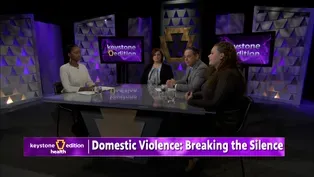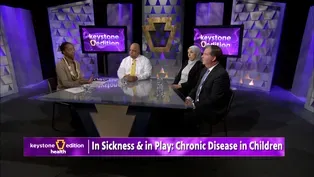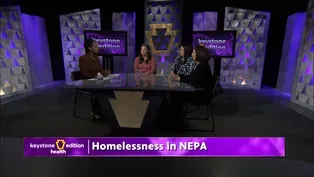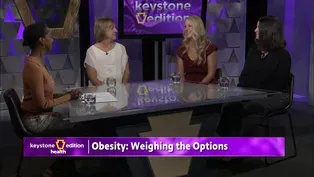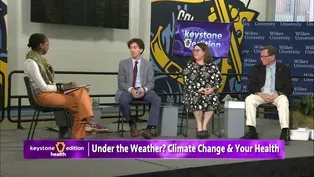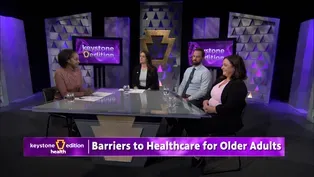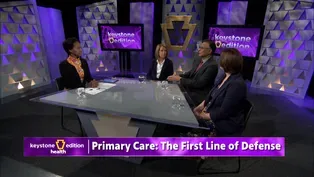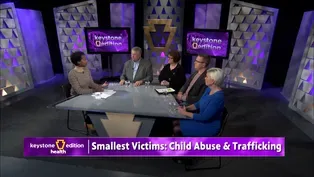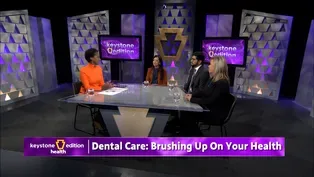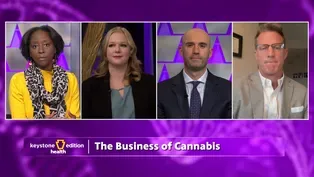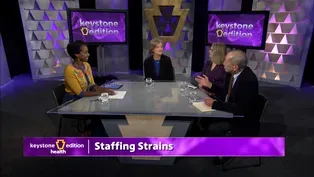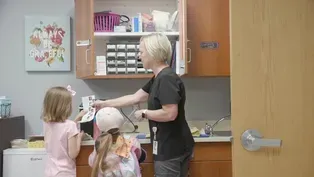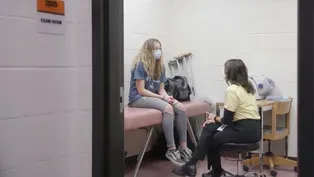Keystone Edition
School Nurses: Answering the Call
5/22/2023 | 27mVideo has Closed Captions
What can our school districts do to help retain and recruit nurses for future generations?
More school nurses are leaving the industry due to low wages and fewer faculty for nursing programs to train the next generation. Pandemic aside, the US Centers for Disease Control and Prevention recommends that schools have one full-time nurse for every 750 students. Now, when students and schools may need nurses more than ever, it?s estimated that about a quarter of schools still have no nurses.
Problems with Closed Captions? Closed Captioning Feedback
Problems with Closed Captions? Closed Captioning Feedback
Keystone Edition is a local public television program presented by WVIA
Keystone Edition
School Nurses: Answering the Call
5/22/2023 | 27mVideo has Closed Captions
More school nurses are leaving the industry due to low wages and fewer faculty for nursing programs to train the next generation. Pandemic aside, the US Centers for Disease Control and Prevention recommends that schools have one full-time nurse for every 750 students. Now, when students and schools may need nurses more than ever, it?s estimated that about a quarter of schools still have no nurses.
Problems with Closed Captions? Closed Captioning Feedback
How to Watch Keystone Edition
Keystone Edition is available to stream on pbs.org and the free PBS App, available on iPhone, Apple TV, Android TV, Android smartphones, Amazon Fire TV, Amazon Fire Tablet, Roku, Samsung Smart TV, and Vizio.
Providing Support for PBS.org
Learn Moreabout PBS online sponsorshipMore from This Collection
Domestic Violence: Breaking the Silence
Video has Closed Captions
Access to the right resources can make facing this challenge a little easier for families (26m 59s)
In Sickness and in Play: Chronic Disease in Children
Video has Closed Captions
About 25% of children in the US aged 2 to 8 years have a chronic health condition (27m)
Video has Closed Captions
Homelessness can happen to anyone at any age or socio-economic status. (26m 59s)
Video has Closed Captions
As we raise the visibility on Transgender young adults and embrace them within our culture (26m 59s)
Video has Closed Captions
Obesity is a serious risk factor many try to avoid when developing healthy eating habits. (27m)
Under the Weather? Climate Change & Your Health
Video has Closed Captions
How does climate change impact individual and public health? (54m 59s)
Barriers to Healthcare of Older Adults
Video has Closed Captions
What progress have local organizations made in addressing these challenges? (27m)
Primary Care: The First Line of Defense
Video has Closed Captions
When was the last time you saw your primary care doctor? (27m)
The Smallest Victims: Child Abuse & Trafficking
Video has Closed Captions
What are the signs to know to spot child abuse and even possible trafficking? (27m)
Dental Care: Brushing Up on Your Health
Video has Closed Captions
How can providers make dental care more affordable and accessible? (26m 59s)
Video has Closed Captions
What does the cannabis industry mean for Northeastern and Central Pennsylvania? (26m 59s)
Video has Closed Captions
Low staffing levels can lead to burnout among healthcare workers (27m)
Providing Support for PBS.org
Learn Moreabout PBS online sponsorshipLive from your public media studios wrva presents Keystone addition health a public affairs program that goes beyond the headlines to address issuesnd north eastern and Central Pennsylvania This is Keystone addition health and now moderator tanya Vertitus good evening and welcome the Keystone addition health I'm Tonyehn Vertitus Thank u for joining us tonight we'll discuss how we can support the nurses who are there for the students have our region as their jobs become increasingly more demanding but first let's ar from wdia is Paul is ah a school nurse can be an important resource for students not just to care for injuries and illness but to encourage and provide education on taking care of their health But with more nurses leaving the field or not entering school nursing due to lower pay existing school nurses have become spread thin between increased responsibilities or of the need to serve students at multiple district buildings advocates are pushing for more recruits recruitment of school nurses and a smaller ratio of students per school nurse to ease some of the strain for Keystone Edition health I'm Paul was ah joining us in studio Tonight we have kamala ship task is certified school nurse in the health services department chair for the northwest area a school district lynn heard is family nurse practitioner with pyramid health care and once a certified school nurse in the north pokeno school district for 27 years and joining us we assume we have aaron man Associate professor at george mason university school of nursing thank you all for joining us I'm going to start with you actually learned not to put you on the spot You've been at this the longest so I would just be curious if you could share your perspective about how school nursing has change from when you started till the end like what would be the biggest highlight so I think when I started in the beginning I had a higher ratio of students but the number of visits to my office office were not as high as the point of retirement and you had a little bit more time to do some community outreach to do some health fares too reach out to the families in the community now it's like you're so there's so many students that come through the door every day that you just don't have time So the ratio is like a major concern when you in Pennsylvania you have one to fifteen hundred students is the max that you can have it would be great if we could get that change to one to because then you have more time to do the things that are important for the school nurse role and for the education of our students kamala you're still on the frontline so to speak Approximately what's the ratio at your school nurse to students I'm very fortunate I'm in a rural school district northwest and our board has been very supportive and administration in hiring schooners So we have just under a thousand and I have myself another certified and a license practical nurse so we are very fortunate however my colleagues I know in areas schools are not quite that lucky The ratio for them is very very unmanageable at times and and it becomes unsafe so I also agree with land I think it's very important If we looked at possibly changing the ratio for school nurses not only looking at 750 cau back in some districts can even be a very high number but you have to look at the health needs in that particular school district or that particular building because sometimes it's more important to have safe staffing for to meet the health needs of those students in the building versus just a number And I know your work you're doing some research around school nursing means and seven gaps that exist in the system can you speak a little bit about that Sure I start goes start talking about the ratio of for example is used to like because it did many documents as our at all but part of the work that we're doing is actually looking to see if even an appropriate way to identify workload as the others mentioned there are so many factors that go into play with workload that it needs to also and that's what our research is looking at is what are those other things So the acuity of the students The number of students that have a chronic condition for example and how often they need to come into the to see the school nurse but other issues some of the social issues really impact the workload of a school nurse I know when I was a school nurse I was it was an I worked a lot with children who are migrants who are the children of migrant farm workers so languages where it's the barrier their housing was a barrier things like that and those also need to be contributing factors when looking at what an appropriate workload is for the school nurse because as was mentioned land particularly when she said it's been an increase many times we think of school nurses as just for the physical illness of as my diabetes very important role of the school nurse but oftentimes social issues such as food insecurity like I mentioned housing or housing that has led or other issues that might be triggering the student who has asthma or the food insecurity could be anyone any student is not getting the food that they need some of these issues also really take a lot of the time with the school nurse for example when they do streaming such as visions screening It's not just during the screenings but it's doing the follow up to make sure that if a student needs to go to get provider to for a full eye exam if the if the students family doesn't have insurance or they're in a rural area and they're not There's maybe have provided provider that's not nearby a school nurse helps connect them with who they need and that takes time So the more families that have those type of needs the more the workload is on the so those are some of the things we're looking at when it comes to policies which ones are the best evidence based as well as things related to the pipeline and some of the issues of with finding enough substitutes school versus as well So I would like to talk a little bit about some of that thing chronic diseases are saying But first I would just like to ask especially since you're still in the schools What would be considered a bad day Right So you have one nurse to however many students What's the most number of students who believe you've seen in a day that varies probably some And again I know other school districts have higher numbers that I do probably close to 50 might be a high day for me and that might include following up with concussion students You know other roles other than just seeing students on a day to day basis I really think the ratio when we look at Pennsylvania We follow something called the Pennsylvania school code which me That's from 1949 so when we're looking at our school ratio want to fifteen hundred That was really you know required or it written into the peer school code back in 1949 which is antiquated for sure And I think they really have to consider you know changing that staffing ratio because while we do have assistance in schools and someone other than the school nurse such as license practical nurses are registered nurses who are not certified school nurses they could be an adjunct to the school nurse and under her supervision and coordination they could assist with the so that is definitely an option for school districts looking at salaries and employment I know that becomes an issue with districts as well and as I said I want to talk about chronic disease I'm sure Things change during the time that your school years we've had conversations about this before and how you're seeing more and more sick kids how much has that changed and what types of things are you seeing that maybe you didn't see when you started out You know I One of the most surprising things for me when I was doing that being a school nurse was seeing students with such so many g i issues to the point of colostomy care in schools You know I thought that was something you didn't see in children being a nurse and I worked in icu I was surprised by that But there are so many issues and I think the number of diabetics has increased as maddox has increased and a big one is you know anaphylaxis and epi pens and allergies there's so allergies out there that really affect our students so aaron when we're thinking about this ratio issue and we're thinking about chronic disease How can nursing school nurses advocate for themselves and are there certain policies in particular particular you think we should be looking you're definitely the nurses can advocate for themselves and the nurses and Pennsylvania do it's been such a pleasure to work with them I think one of the main things though how they can his first by looking at their data and we mentioned that we noticed the transfer of being able to share not nothing that about a student in particular but just the numbers So for example example it has the data and the research shows There's been an increase in the number of students with asthma babies and I want to bring in mental health as well And with school nurses and mental health before covered the data show that about one third of the visits that that came to a school nurse's office this is nationally not just in Pennsylvania i'm more for mental health concerns because you think about it You know I know when I get stressed I get a stomach ache oftentimes will get a headache students do too and they might not realize what's causing that one of the great tools and skills school nurses have is being able to assess for that So when those increase There are things Definitely a school nurse can do And then they can also help refer them to if they need further treatment or more more care but keeping those numbers is a big way that school nurses can advocate It was mentioned like the laws about the ratio our older nineteen forty There are several laws actually when we did an analysis of the applause related to school nurse nursing and school help the schools A lot of them are pretty antiquated some of them don't do not follow best practice of for example i'm scoliosis screening it's found that that's not a really good use of schools time to do but it's one of the laws on the books for school nurses so I think one way that school nurses can advocate is using the data to help them help everyone see what their role has really evolved to be because it's oftentimes still just not understood by many including nurses and putting educators others and then provide partnering with other indicates to help make sure that the laws that are on the books are ones that are best practice and I really meeting the needs of the current status of society right now so I do want to talk a little bit about screenings because of course we have those basic screenings and I always say a school nurse found out that my daughter needed glasses in daycare They said she was clumsy so thank you school for that but I imagine that sometimes you come across more serious issues so there may be a child that's been to the office a couple of times and I was wondering if one of you might be willing to share an experience about some of the more serious issues Well I think like four for me like a new onset seizure and getting that student to understand the seriousness and how to to deal with the seizure And you know this If the student has multiple seizures doing the same school day you know how to manage that and get an action plan and get that student to be able to be educated and function in a school setting So I think that can be very challenging I think think that's sometimes you're You get so caught up in the educational component for an individual student that the screenings kind of take a second second step you know you don't have time for all of that and how do your partner with the parents when you have children who have chronic disease issues or parents may not even be aware how do you facilitate that partnership I personally do a lot of phone calls If anybody walks by my room they could say that i'm frequently on the phone Because I think that's the best way is no phone to phone contact with parents they do like e-mail but most of the time my communication is directly with the parent by phone and often consistency I think it's a school nurse you're one of the most trusted people individuals in the school and I think be given be getting that good collaborative relationship with a parent is very important And I think we obviously have to address behavioral health system Obviously there's guidance counselors but it sounds like from what all of you are saying these children are more than likely showing up in the nurse's office So what are we doing for these children and how do we help that Well there's a lot of of things that you can do Just simple techniques You know teaching them how to take deep breaths or count to ten or you know a little bit of mindfulness to just try to control some of their stress and anxiety There are you know some chronic long term mental health and behavioral health concerns that you really have to Again collaborate with the families collaborate with the guidance counselors kabul collaborate with the teachers to try to make improvements in that You know and also with their providers we've been very fortunate You know with our relationship recently with the medical society luzerne and lackawanna medical society have been very supportive of school nurses and you know things like that where we can include improve our communication just to help each individual student is so important to get an idea of how much a school nurse does in a day we met carol liner a nurse in the weight in highland school district in a school district in philadelphia There was not a nurse present in that school she had been traveling to a different because they do not have versus for each school there was a sixth grade student who was having an asthma attack and decided to go home So she could use her medication at home she ended up dying on her way to the hospital Later on that day our school district is is lucky and that it does have a school nurse for each one of our schools many schools throw Pennsylvania and throughout the united states do not have a nurse within each school so the nurses have to actually do what i'm going to be doing today and going back and forth between the schools and coordinating Do you need me over there now I'm running over too These are the students I see on a daily basis so I average around 70 to 80 students per day coming through my office regulation in between all that I have to try to do all of the other things that I am here for as well Yeah Is she in your room ok Her sugars are running though so i'm going to run into is down to her So we have a continuous food clothes monitor we're able to see on our i've had for our diabetic students I do have alarms for them going high and I also have an alarm for it being low well I tried to do Daly as you have no regrets So that's why do you do a lot of contacts with the parents worrying You know this child may have bump there it wasn't a big bump But even something like that can cause a concussion one parent told me one time that when she got to the hospital she said oh my child Looks good And the emergency room doctor had said the school nurses its fix them before they get here We get to see these students all year long Sometimes multiple times a week sometimes daily We get to know them if they're not acting themselves were able to pick that up I love that I get to see the entire growth process in the maturity and who they become so I think all of the students has just special all about aaron As we just heard this nurse is working in multiple schools at once I'm one of the things that we talked about was the shortage and nurses in general How And the nursing school Are you encouraged nurses to consider becoming certified school nurses yeah well there's a couple of different ways The first think is that in that baccalaureate or for your registered nurse program which is what I am teaching there's a rotation for community and public health nursing and oftentimes and many universities is a similar where we will have students go to the schools as part of their clinical rotation so that they're exposed and they actually can see what happens That's what interested me when I was in school I thought I would be a pediatric hospital until I did my rotation in school of nursing and I found an area that I really love I loved working with all the students there so I think that's a big area as well as just finding other opportunities to help them talk to school nurses and others that work in these other settings that they might not have thought of so that they're able and think to go into school nursing which is a very rewarding profession When can you tell us what extra training you need to become a certified school nurse so currently you need a bachelor's degree in nursing and then you have to go back for your certification when I received my certification it was 18 credits I think there are some schools now that you can do a 12 credit or fifteen credit certification and that gives you a level one certification and then it's the same as a teacher level one and then you become a level two after so many years So that's the the The basic requirements but then add a certain point you have to have your masters You know i'm not I don't remember the exact regulation but within seven years you have to start back you know once you become tenured you have to start working on your masters I can add to that because i'm a little bit less than experience than you are But as you are allowed to get a level two when you are working in the field within three years You have to be at least three years as a certified school nurse and then you can apply for level two which means you have to have 24 credits past ubs in so many nurses go right toward a master's degree whether it be a nursing public health education and then after that it doesn't stop because to maintain our level two certification you have to continue with one hundred and eighty continuing education hours That's part of the Pennsylvania department of ed requirements in addition to that as nurses under our in licensure we have to maintain 30 continuing education hours for nursing as well So there's a lot of post education that needs to be done to maintain ah certifications and our position as an education specialists under the The teachers umbrella under the Pennsylvania department that well we talked Someone brought up the administration before and with administration I would It seems to me that a lot of people believe the nurses still just doling out band aids and taking temperatures you all are actually quite qualified people with a lot of expertise and should be treated as such What are some of the things that can you Like to see change in terms of the role of a school nurse and working with administration aaron you might want to jump in here as well to but apparently outside over to you Well I am very blessed I have a principle who really understands my role but I believe getting more information out whether it be too or administrators arc community our faculty as to the role of the certified school nurse because there's so many it'so divers we follow the nursing process so r studentsho are wahing this e nursing p ur assessmt your nuing diagnos your issue thatou comeanning forny se word out tre aboutwhat's goi scl our in seices thers people tt e nothe olr So thers going toe a loof us retiri in thnext 10 yearand I t coiderchool nursg areaf nursing d 're ry fortuna to ve t mos taylor fodation to lp us help promote the school rse profsion because a commitassessme needs asssntor programs are large funded by moses taylor founti which has beenremendous we get a nurses certainly do getreat turl a t of educational opportunits through that And you know know I thi that's somethinvery positive that has comout and I haveone a lot of think through e school nur rules education e althou there are a lot more more needs to be done and I ink that we have so man opportunies and so many things coming forward that a going to be so helpful for preschoonurses something that you ner from when I stard when I began when I started You were likeyou're aln entity by yourse but you didn't really have th support from community agcies which we have now which is fanttic And I was wondering if you like to add to that because you were brought in to be part of that support network ando assessments yeah we were the center for hool health innovation equality a wasble to do that needs assessment that lynn mentioned So a couple of things I wanted to adjust to further on is some from this work as well as other work that we've done just to be clear I think one of the big area is is that educatorthere arsome that are incredibly supportive but at usually is because they have worked or in one study I find it was because they had a relative who is a nurse and under a school nurse and understood what school nurses do we could not find i'm notsaying thy but if the are very few programs for teachers are principles or other educators that actually talk about the role of the school nurse for other support personnel so they oftentimes they have so many responsibilities oftentimes learn on the job and there's They're not always with the orientation that might be helpful for them to really understand what the role of the school nurse is and what they could rely do To be able to work to their full scope so I think that's an ar No fault Other than it's just that's how it'been that wcan relook at just see if there's a way that can be part of their university professional development as was mentioned we have tried as school nurses and we do have some as was mentioned by criminals that some outstanding support by administered but oftentimes but administrators are given training that they seeion of haa is more related to what they do and they might not come to some of the trainings that are about the role schooners or what the school nurse can do with helping themwith mee responsibilities that they have So I think that's one area is h we can make sure that we're able to if the audience that's needed Wee really there to help and can evidence has shown that where there is a school nurse in the building it actually decreases the amount of time that principles have to many of the issues as well as for teachers or secretaries so I think that's really imrtant as was mentioned the pipeline for more school nurses Many are retiring So we also need to make sure that the next generation understand the role of the school nurse and around waiting for thet it isn'g child that breaks and arm on the playground but it's there's so many needs so rewarding but it's a very specialized skills that I think the other thing that I think needs to come into play that hasn't been mentioned that we've looked at though is that the funding I think there are many educators that would love to have more schooners is I don't think that's the problem I think there is not always but I think second is the funding and we mentioned some of the laws and Pennsvania is very unique in that they have the school health annual reimbursement requests system where data is put it and that and they get some reimbursement back the distri's too but from what we could have actually stopped Ok sorry great conversation but we're running out of time I just want to thanyou all for having joined us today I think that we all who are parents are definitely going to advocate more for nurses thank you to all of our gas for joining us And thank you for watching this season of Keystone addition health I'm teaching Vertitus Have a great evening
Providing Support for PBS.org
Learn Moreabout PBS online sponsorshipSupport for PBS provided by:
Keystone Edition is a local public television program presented by WVIA
